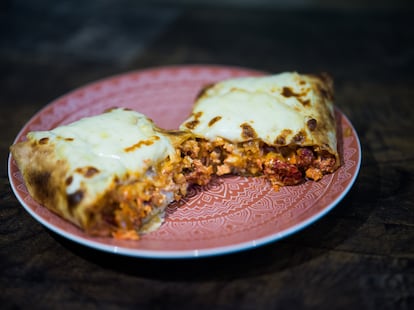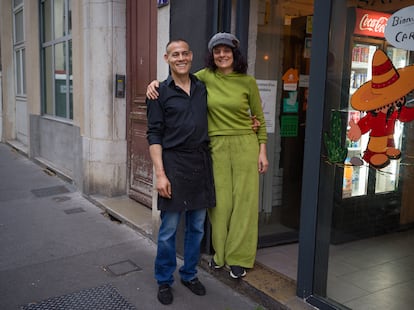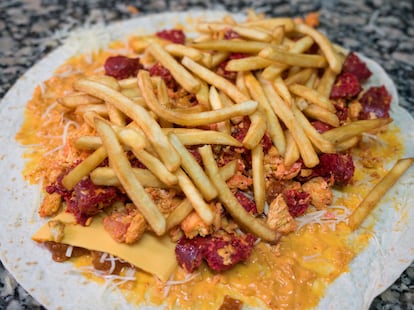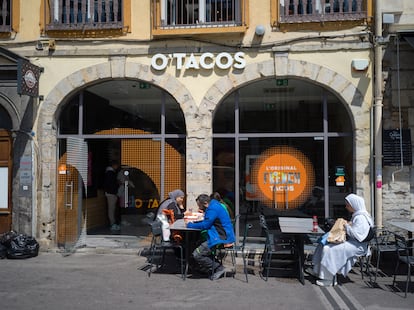The secret of the taco: modern, multicultural France’s fast food phenomenon
The success of this cheap and popular food, which shares little more than its name with the Mexican original, was born of profound changes in French society

In the country of haute cuisine, and in the suburbs of one of its most renowned gastronomic cities, a dish was born at the beginning of this century that typifies modern France: tacos. From there, it has become almost a national dish.
The French taco shares little more than a name with the Mexican version. It originated in Lyon, or in Grenoble, according to some theories, and consists of a wheat tortilla in which are wrapped all manner of foodstuffs: meat, salad, chips, and cheese sauce. It is popular, fast, calorific, cheap, solid, robust food. After eating one, “you feel like taking a nap,” says a 20-year-old student in a restaurant belonging to the O’Tacos chain in downtown Lyon. With 300 restaurants nationwide, O’Tacos is the McDonald’s of the French taco world.
The taco, at the same time, belongs to what could be called symbolic food: we are what we eat, and the success of tacos in recent years reflects profound changes in French society, as Jérôme Fourquet and Jean-Laurent Cassely explain in the essay La France sous nos yeux. Économie, paysages, nouveaux modes de vie (France before our eyes. Economy, landscapes, new ways of life). Fourquet and Cassely define the taco as “a true product of cultural and culinary hybridization.”
“The taco is multicultural, and this is what makes it different,” says Emmanuelle Nemili, who, together with Nasser, her husband, runs Mister Tacos in Villeurbanne, on the outskirts of Lyon. “In our case, the taco has a Tunisian touch and a French touch.” Emmanuelle is French-Lebanese; Nasser, Tunisian. They have been at the helm of Mister Tacos for almost two decades, an obligatory stop on any tour of the origins of the French taco. Tacos were served here before they were famous: 15 years ago, there were already lines outside the store. Karim Benzema and Tony Parker, global and local sporting icons, have eaten their fill of tacos here. “Benzema and Parker queued up like everyone else,” Nasser confirms.

“I add a touch of cumin to the merguez sausages, I marinate the meat cutlets with curry and add a little turmeric,” Nasser explains as he unfolds the choreography of the taco: the tortilla spread out and the filling with the ingredients, before folding it all up and putting it in the oven (in his case a pizza oven and not a griddle). “And here is the cheese sauce; a classic in all tacos.” Emmanuelle reels off the ingredients: “Emmental, mustard, salt, pepper and cream.” There is no single recipe for the French taco, however. Nasser explains that the format allows for all combinations. You could go to the restaurant every day for the or the rest of your life and never have the same taco twice.
On this occasion, Emmanuelle and Nasser serve us a taco with merguez and chicken, in addition to fries, homemade “touches” and chakchouka, a Tunisian sauce based on onion, bell pepper and tomato concentrate, and another with chicken, goat cheese and honey. First observation: it is fragrant, juicy. Second: it is dense, a sort of compact brick. Third: at least at chez Emmanuelle and Nasser, who use fresh produce, the taco is fast food but it is definitely not junk food.

O’Tacos: the French taco, supersized
Speaking from Dubai, Patrick Pelonero explains the history of O’Tacos. Pelonero, the son of Italian immigrants in the Alpine city of Grenoble, left school at the age of 16 and went to work with his father in construction. But in the winters, there was little to do and eventually he began to think about starting a business. The logical thing was a pizzeria, but one day a friend took him to eat at a place called Tacos de Lyon. For Pelonero, it was a road to Damascus moment. It was 2007 and Pelonero, 21 at the time, made the decision that changed his life, and the history of fast food in France. He opened a restaurant called Tacos des Alliés, which he would later expand to the suburbs of Paris. He then teamed up with a school friend who had opened a restaurant in Bordeaux: O’Tacos was born.
Pelonero, who sold his stake in O’Tacos to an investment fund and now lives in Dubai, explains that the key to success was, above all, the product: “Their mission is to fill you up for not a lot of money. It’s phenomenal value for money, compared to the competition in fast food.” The other key, as important as the first, is marketing. What explains O’Tacos’ success is control of social networks, having been the first brand to use influencers. “It went viral,” Pelonero recalls “In the lines in front of the restaurants, young people were making content for Snapchat. You had to eat at O’Tacos.”

There is a generational component to the taco, according to Fourquet and Cassely. “If kebabs, which had their heyday in France in the 1990s and 2000s, are the millennial dish par excellence, tacos take the place of kebabs for generation Z,” they write. A survey by the Ifop polling institute indicates that the younger the French are, the fonder they are of tacos: 4% of people born before 1955 like them compared to 29% of those born between 1971 and 1985 and 47% of those born after 1996. It is a product that appeals to youth, and to the suburbs, “which attracts young Muslims thanks to its halal meats, does not repel female consumers unlike the kebab, which is mostly consumed by men, and has a cooler and more modern image than independent snacks and hamburger brands.”
While the first mystery about the French taco is whether it was invented in Lyon or Grenoble (there is a documentary dedicated to answering this question), the second is the secret of its success. According to Nasser, of Mister Tacos, it has nothing to do with the recipe or marketing. It is something else: A blend of flavors and memory. “I’m going to tell you about the secret,” he confides. “The secret doesn’t come from the food. The secret comes from the soul. That’s why you like whatever your mom cooks for you, even if it’s a fried egg. Because she’s put her soul in there.”
Sign up for our weekly newsletter to get more English-language news coverage from EL PAÍS USA Edition
Tu suscripción se está usando en otro dispositivo
¿Quieres añadir otro usuario a tu suscripción?
Si continúas leyendo en este dispositivo, no se podrá leer en el otro.
FlechaTu suscripción se está usando en otro dispositivo y solo puedes acceder a EL PAÍS desde un dispositivo a la vez.
Si quieres compartir tu cuenta, cambia tu suscripción a la modalidad Premium, así podrás añadir otro usuario. Cada uno accederá con su propia cuenta de email, lo que os permitirá personalizar vuestra experiencia en EL PAÍS.
¿Tienes una suscripción de empresa? Accede aquí para contratar más cuentas.
En el caso de no saber quién está usando tu cuenta, te recomendamos cambiar tu contraseña aquí.
Si decides continuar compartiendo tu cuenta, este mensaje se mostrará en tu dispositivo y en el de la otra persona que está usando tu cuenta de forma indefinida, afectando a tu experiencia de lectura. Puedes consultar aquí los términos y condiciones de la suscripción digital.









































